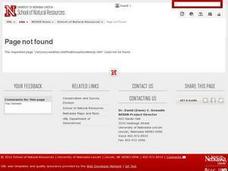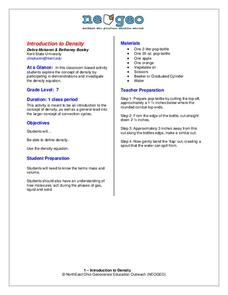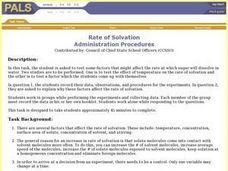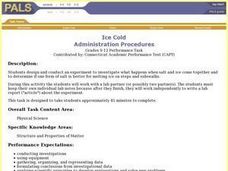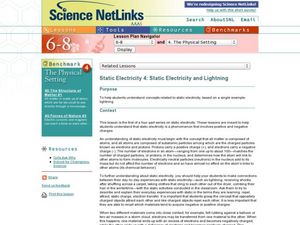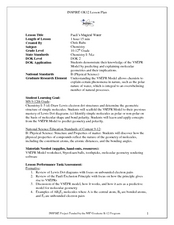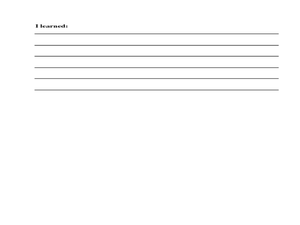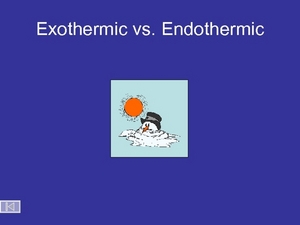Curated OER
Diffusion
Students develop the concept of diffusion. In this science lesson plan, students demonstrate diffusion of molecules of matter in various states.
Curated OER
Differentiate Elements, Compounds, and Mixtures
Young scholars examine the differences between elements, compounds and mixtures. Using diagrams, they compare and contrast atoms and molecules and describe various chemical reactions. They distinguish the differences between ionic and...
Curated OER
Creative Expressions: Phase Changes
Students place themselves in the position of a water molecule, ice molecule, or steam molecule and then describe the process of changing phase.
Curated OER
Heat And Heat Transfer
Students role play molecules in a container as the container is heated to develop a definition of heat and temperature. They also observe demonstrations of conduction, convection, radiation, and phase transfer. Using these observations...
Curated OER
Solids
For this solids worksheet, students review terms associated with solid matter including, freezing and melting point, viscosity, and Brownian motion. This worksheet has 1 short answer and 14 matching questions.
Curated OER
Earth's Atmosphere and Temperature
Students explore the layers of earth's atmosphere and conduct an experiment to identify carbon dioxide. They construct models using styrofoam to represent molecules in the atmosphere's layers. To discover how sunlight efffects...
Curated OER
Boron and Oxygen Atoms
In this atom molecule worksheet, students will use a boron atom diagram to answer three fill-in-the-blank questions. Then students will label the protons, neutrons, and electrons on an oxygen atom diagram.
NorthEast Ohio Geoscience Education Outreach
Introduction to Density
Seventh grade scientists weigh in on the concept of density. In a nutshell, they participate in the following activities:
Measurement of the mass and volume of fruit in order to compare densities
Measurement of the mass of oil and water...
Curated OER
Rate of Solvation
Pupils test factors that may affect the rate at which sugar dissolve in water. They conduct two studies: One is to test the effect of temperature on the rate of solvation and the other is to test a factor which Students come up with...
Curated OER
Ice Cold
Young scholars design and conduct an experiment to investigate what happens when salt and ice come together and to determine if one form of salt is better for melting ice on steps and sidewalks.
Curated OER
Amazing Water Changes
Learners explore the properties of water and how it changes states. In this kindergarten to 2nd grade science lesson plan, students pair a hands-on science activity with two suggested books. This inquiry lesson plan...
Curated OER
Temperature and Enzymes
Young scholars compare the times it takes the milk in each of two cups to curdle. They are told that an enzyme that is added to the milk, rennin, is involved in the natural curdling process of milk. Students are asked to consider what...
PBS
NOVA Elements
It's like a periodic table variety show! When the plethora of periodic table apps becomes ho-hum, this one may revive interest.
Curated OER
Using Ion Exchange Chromatography to Separate Proteins
Students explore protein purification by separating a positively charged molecule, lysozyme, from a negatively charged molecule, albumin, at neutral pH using ion exchange chromatography.
Curated OER
Pauli's Magical Water
Students predict the shape of molecules using VSEPR theory. In this chemistry lesson plan, students differentiate a polar and nonpolar molecule. They discuss why water's polarity is very important.
Curated OER
Exploring Magnetism
Twelfth graders experiment with magnets in order to visualize that magnets have a north and south pole, some materials can be magnetized, and magnetization occurs because of the magnetic moments of individual molecules in matter.
Curated OER
Einstein's BIg Idea
High schoolers discuss what the m in E=mc2 represent. They relate that mass in a chemical reaction is always conserved. Students convey that atoms rearrange themselves in chemical reactions to form different molecules and compounds.
Curated OER
Learning Lesson: Sweatin' to the Coldies
Young scholars participate in a demonstration to show the change of water vapor to a liquid. They discuss the three states of matter. They examine flash flood safety to end the instructional activity.
Curated OER
How Much Do I Know About Water?
Sixth graders explore how water behaves on a penny. In this states of matter lesson, 6th graders observe water as they add drops to a penny. This lesson helps students apply the adhesive properties of water to the water cycle.
Curated OER
Chemical Bonding
Eighth graders identify the three main types of chemical bonds. In this chemistry lesson, 8th graders draw Lewis dot diagrams of elements and determine the bond formed. They create a model water molecule.
Curated OER
Resources - A Reading Guide
In this resources learning exercise, students compare and contrast physical and chemical properties and changes. Students review the periodic table, pattern of atomic numbers and chemical reactivity. This learning exercise has 56 short...
Curated OER
Density and Mass
Students experiment to find which liquids are more dense. In this density and mass instructional activity, students predict and then test objects to observe and measure their density. students observe which items sink and float....
Curated OER
Exothermic vs. Endothermic
The PowerPoint opens with video footage of the decomposition of nitrogen triiodide and then explains it with diagrams. Graphs of exothermic and endothermic reactions are exhibited, as well as one for the effect of a catalyst on reaction...







